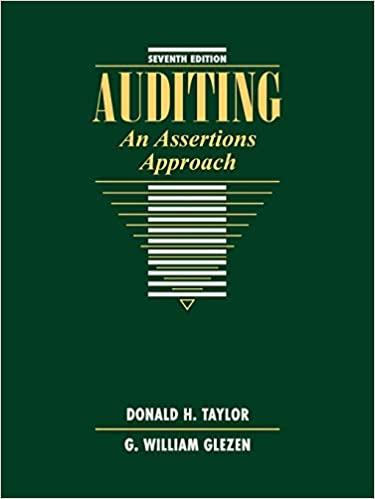The following circumstances affect the comparability of financial statements between periods. The effect is material unless otherwise
Question:
The following circumstances affect the comparability of financial statements between periods. The effect is material unless otherwise indicated. For each circumstance, state whether the auditor's report should be modified and why.
a. The client changes from the cost to the equity method of accounting for a significant subsidiary.
b. The client changes its estimate of warranty costs from one percent of sales to two percent of sales.
c. A retail merchandise client changes from charging store opening cost to expense to deferring those costs. The change had an immaterial effect in the current year but is reasonably certain to have a substantial effect in future years.
d. The client changes from a FIFO to a LIFO basis of pricing inventory.
e. The client merged with another company on a pooling-of-interests basis but did not restate prior periods that were presented on a comparative basis with the present period.
f. The client changed from a direct costing basis to a full absorption basis of accounting for inventory.
g. The client reclassified certain items in the prior-year financial statements to make them comparable with the current year. Significant amounts such as net current assets, total assets, gross profit, and net income were not affected.
h. In 19X2 the client operated a fleet of buses as a bus company. At the beginning of 19X3 the client sold all of its bus assets and purchased a chain of bookstores, which it operated in \(19 \times 3\).
i. In \(19 \times 2\) the client capitalized overhead costs associated with the construction of new facilities. In 19X3 these costs were expensed because capitalization resulted in the cost of the new facilities exceeding their market value.
j. In 19X2 the client treated certificates of deposits of four months' maturity or less as cash equivalents in the statement of cash flows, while in \(19 \times 3\) only certificates of deposits of three months or less were treated as cash equivalents.
k. In 19X2 the client made a material mathematical mistake in computing prepaid expenses. In 19X3 the computation was made correctly.
Step by Step Answer:

Auditing An Assertions Approach
ISBN: 9780471134213
7th Edition
Authors: G. William Glezen, Donald H. Taylor





